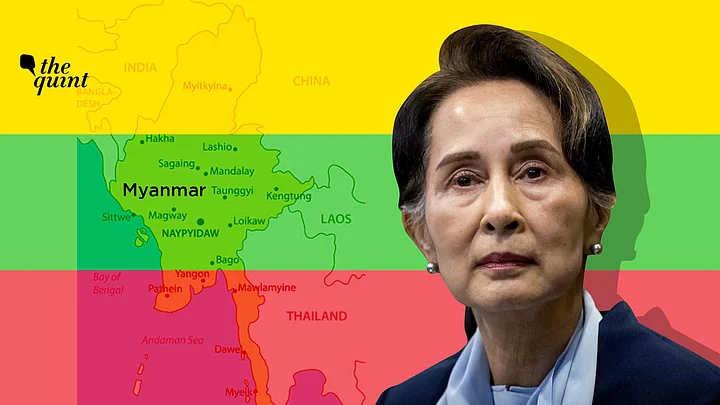India on Wednesday, 31 March, condemned the ongoing violence in Myanmar and urged for peaceful resolution and maximum restraint.
India called for the release of detained leaders including de facto leader, Aung San Suu Kyi and President Win Myint after Myanmar’s military coup on 1 February. Ever since the coup, the death toll in Myanmar has been on the rise, as security forces grow increasingly violent in suppressing those protesting.
India’s Permanent Representative to the United Nations, TS Tirumurti tweeted highlights of his closing remarks at the 15-member closed consultation of the UN Security Council held on Wednesday.
Tirumurti condoled the loss of lives, welcomed ASEAN efforts, and reiterated India’s steadfast commitment to democratic transition. Tirumuti’s remark emphasised that the situation needs greater engagement, and India will extend assistance to Rakhine state development programme.
Suu Kyi, 4 Others Charged Under Official Secrets Act
In a latest development in the crisis, deposed leader Aung San Suu Kyi, along with four of her aides, were charged with violating Myanmar’s colonial-era Official Secrets Act, her chief lawyer, Khin Maung Zaw, informed on Thursday, 1 April.
Suu Kyi, three of her deposed Cabinet ministers and her detained Australian economic adviser, Sean Turnell, were charged a week ago in a Yangon court, Suu Kyi’s counsel told Reuters via phone, adding that he learned of the charge two days ago.
‘Bloodbath Is Imminent’
The UN noted that since the Myanmar coup on 1 February, there have been arbitrary arrests of over thousands of people, as well as the prevalence of enforced disappearances, reported PTI.
The Secretary-General’s Special Envoy on Myanmar, Christine Schraner Burgener briefed the Council on Wednesday, and warned of an ‘imminent bloodbath’ in the country, after over 520 people lost their lives in the violence since the coup, reported Reuters.
Over 100 anti-coup protesters were reportedly killed in the country by its security forces, on Myanmar’s Armed Forced Day (27 March) alone.
Burgener noted that the urgency for a solution could not be clearer, and violations of international law, as well as serious international crimes are happening openly. “I fear this trend will become bloodier as the Commander-in-Chief seems determined to solidify his unlawful grip on power by force,” said Burgener, as quoted by PTI.
Asking the council to consider taking “potentially significant action” and “play its part”, Burgener stated that the crisis is rapidly unravelling a fragile public health sector, especially in light of the COVID pandemic, and said, “Consider all available tools to take collective action and do what is right, what the people of Myanmar deserve and prevent a multi-dimensional catastrophe in the heart of Asia,” quoted Reuters.
Burgener asked those in contact with Myanmar armed forces that this move has threatened the security of neighbouring countries, as well as impacted the reputation of Myanmar, asserting for the restoration of the civilian rule.
“It is our obligation to help restore a return to civilian rule under the elected government headed by President Win Myint and State Counsellor Aung San Suu Kyi, whom this Security Council rightfully continues to refer to as ‘members of the Government’,” stated Burgener, quoted Reuters.
Background
Aung San Suu Kyi was detained, along with her ally President Win Myint, and other senior leaders early on Monday, 1 February, following a military coup in the country.
A crisis has been brewing in the country between the military and the democratically-elected government ever since Suu Kyi’s party – the National League for Democracy (NLD) – claimed a resounding victory in the country’s elections on 9 November 2020.
However, even as Myanmar’s military vowed to honour and protect the state’s Constitution on 30 January, it went ahead and declared a one-year emergency just hours before the Parliament was to resume for the first time since the elections. The military has, on their part, also been alleging “election fraud”.
The Suu Kyi-led NLD had formed the first democratically elected government in 2015 after a 50-year-long military junta rule in the country.
(With inputs from PTI and Reuters)
(At The Quint, we question everything. Play an active role in shaping our journalism by becoming a member today.)
